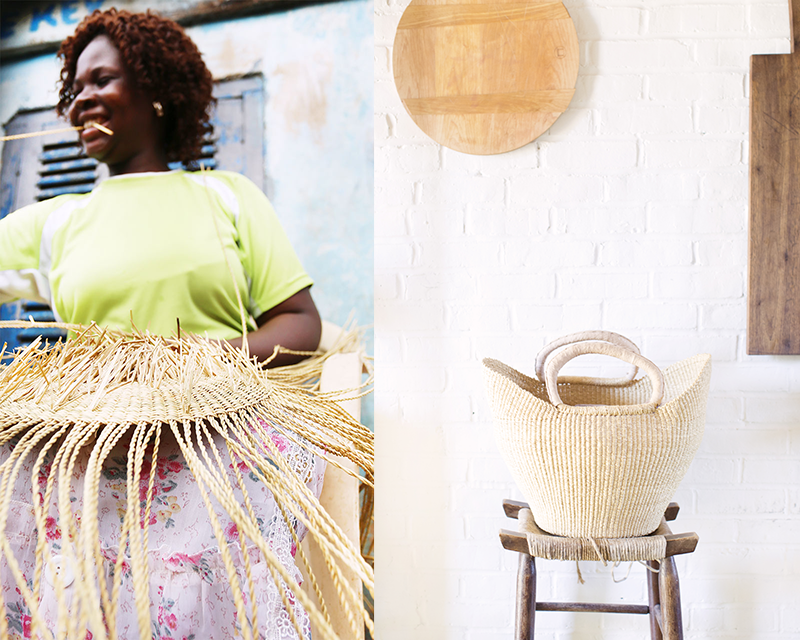
Linking Local Artisans to Global Markets
How Indego Africa is supporting young women basket weavers
Mavis Adongo lives in the Upper East Region of Ghana. Her passion is bolga basket weaving – a technique indigenous to the Bolgatanga region of northern Ghana where artisans weave baskets from a thick, locally grown straw commonly known as elephant grass. Mavis dreamed of starting her own basket weaving business, but struggled to amass the capital she needed to begin. Instead, she worked at a broadloom workshop at a Kumasi government-run cultural centre to make a living and support her family. Then she learned about Indego Africa.
Indego Africa provides employment and education opportunities that help female artisans in Rwanda and Ghana achieve financial independence, while satisfying market demand for the hand-crafted products they produce. In this way, Indego Africa addresses both the supply and demand side of the unemployment equation.
On the demand side, Indego Africa procures orders from high-end global retailers and eco-conscious consumers for artisans in Rwanda and Ghana who make their living designing, selling, and exporting the products they make by hand. On the supply side, Indego Africa trains these artisans to produce patterns that appeal to an international market, and quality checks the products made for export. Grants, donations, and 100 percent of the profit from product sales go towards supporting artisans with vocational education, basic business skill training, technology workshops, and a youth leadership academy.
The Mastercard Foundation partnered with Indego Africa to expand its program from Rwanda to Ghana. The decision to replicate the program in Ghana was based on a market assessment that identified an international market for bolga baskets. Indego Africa began first working with Mavis on a one-on-one basis ordering sample baskets. Impressed by her skill-set and finished products, Indego Africa helped Mavis start her own bolga basket weaving cooperative in Kumasi.
Mavis was provided with start-up resources including one year’s worth of rent and pre-treated bolga straw where each strand is rolled out individually to make it pliable; a highly time-consuming process. With orders from retailers already confirmed, Mavis set out to recruit other young women to join her cooperative.
Discovering a new way to work
Mavis recruited five young women. While most had learned bolga basket weaving as children, they had never considered it as way to earn an income. Four of the five had migrated to Kumasi from Bolgatanga in search of better work opportunities. Instead, they found an oversaturated job market with few wage-earning opportunities available, especially for those with low levels of education. For Linda Alorizi, one of the cooperative members finding work was a challenge, “It is very difficult because there are few job opportunities available. People with little or no education like me are not even considered. Also, I lack specific skills so I had a hard time finding a job,” she said.
As the cooperative began to weave the baskets, Indego Africa’s Ghana team discovered that the women were having difficulty following written measurements and instructions due to their limited literacy skills. Indego Ghana adapted their processes so that artisans were provided with hand-drawn designs, measurements, and pictures of the finished products from Indego Africa’s catalog.
Mavis and her co-workers also faced some challenges with quality control and fulfilling orders. The concept of quality control — of producing products in a standardized fashion — was new for them. To overcome this challenge, Indego Africa implemented intensive quality control and production training at the cooperative and provided vocational training support in production management, such as organizing raw materials, to help the artisans work more efficiently. The cooperative members would then send pictures of orders in progress to Indego Africa staff for quality control checks.
Securing a stable livelihood
Before partnering with Indego Africa, the members of the bolga basket weaving cooperative were earning approximately USD$9.30 per month and were struggling to find sustainable employment to support themselves and their families. Today, they are steadily employed, filling consistent orders, amd earning on average USD$74 per month, which represents a 695 percent increase!
Furthermore, the cooperative earned close to USD$4,000 worth of purchase orders during their first eight months of operations and is now able to produce 12 different product designs. Their baskets can be found at upscale retailers such as home and lifestyle brand, Serena & Lily, and Japanese fashion and accessories store, L’Appartement.
Gloria, a cooperative member, said working with Indego Africa has been beneficial. “We have constant orders coming in and this helps us get more money. As a result of this partnership, I now have a steady job and am able to work even though I have a small baby,” she said.
Indego Africa is supplementing on-the-job business learning by helping the artisans enroll in its Basic Business Training program in Kumasi. Three of the artisans have enrolled and are applying this acquired knowledge to improve management and productivity at the cooperative.
By providing access to an export markets, technical and quality control training, business education, and start-up resources, Indego Africa has helped six young women in Ghana transition to secure employment and achieve economic independence.
Indego Africa will be featured in an upcoming case study series that explores different pathways toward scaling youth employment programs in Sub-Saharan Africa


